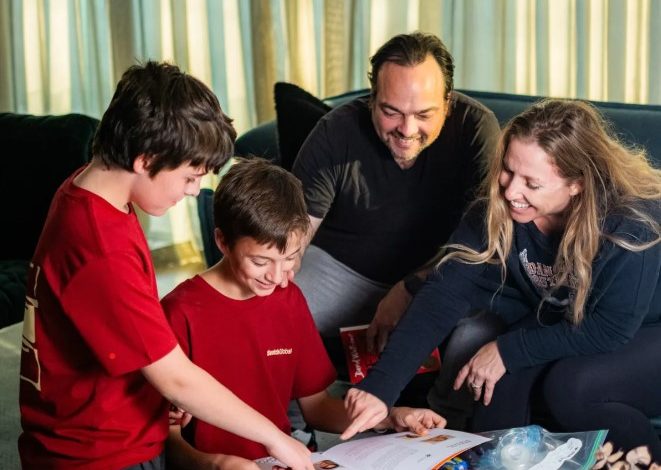
Established in Switzerland in 1968, the International Baccalaureate (IB) is one of the fastest-growing education institutions in the world and is widely regarded by top universities globally as the best preparation for post-secondary school study.
Globally, there are over 5,600 schools offering at least one of the IB programs, while in Australia, there are 206 IB schools.
For the Diploma program, the equivalent of Years 11 and 12, students take 6 subjects, including a second language, while also completing a theory of knowledge course and a 4,500-word academic research paper on an area of their choice.
Students are also expected to develop interpersonal skills, a sense of commitment to contributing to the global community and service learning throughout their two years. The programme that shapes this is the Creativity, Activity and Service component, which is likened to the Duke of Edinburgh.
In 2022, the IB launched a fully online DP pilot, with seven schools worldwide providing the opportunity for students to complete their Diploma wholly online. Those schools are Aoba (Japan), Dwight Global Online (with schools in New York, London, Seoul, Shanghai, Dubai and Hanoi), Eastwood Global (US), King’s InterHigh (UK), OnWorld (with 36 schools across nine Spanish-speaking countries), and SEK Education Group (schools in Europe and the Middle East) and Scotch Global, in Perth, Western Australia.
Launching Scotch Global
Cara Fugill is Head of Scotch Global and the former Director of Teaching and Learning PK to 12 at Scotch College. Founded in 1897, Scotch College is an independent boys school offering a K-12 program to just under 1,600 students, while the brand new Scotch Global delivers a wholly online program to students of all genders from 12 to 25 years.
“Established mid-2023, Scotch Global provides a modern alternative to traditional schooling and to extend learning opportunities beyond Year 12,” explains Fugill. “Scotch Global serves a diverse community of co-educational students aged 12-25, regardless of their learning styles, gender, or location.”
Because Scotch was chosen for its ability to offer a world-class curriculum and its strategic location in a time zone shared by over 60% of the world’s population, Scotch Global students come from everywhere.
“Remote, regional, local and international; anywhere from Meekatharra, Mukinbudin, Perth, Qatar, Germany and Italy. The location doesn’t matter, as long as the time zone works for their online classes,” says Fugill.
The IBDP online Pilot will last a few years while data is collected from the six international schools.
“I don’t think this is to decide whether the IB online is a viable option,” explains Fugill. “I believe it is to ensure that when they do open this up to more schools, they will have clearer guidelines and support for the schools to make sure everyone can get it right. We have invested considerable time and money into innovating, and our hope is that other schools will benefit from what we have learned. Education isn’t a competition, it is about improving the outcome for all children regardless of where they are.
Scotch College has been delivering the IB across PYP, MYP and DP for over 12 years, but the online program is not simply a matter of taking traditional school and putting it online. It is also substantially more than the ‘online teaching’ students experienced during the pandemic.
“The pandemic was an excellent springboard to experiencing the merit and the pitfalls of online teaching,” explains Fugill. “With anything new, it can be a time of adjustment for students and teachers alike. However, I believe their research during and after the pandemic found that some students did better in an online environment compared to the hustle and bustle of a high school.”
“The IB online program will open the doors for many students who are prohibited from taking the IB because they can’t find a traditional classroom that meets their needs. I believe this is in line with the IB’s philosophy on equity and inclusion, and I applaud them for the decision. In Australia, we have many capable students who simply can’t attend traditional school, and there are few options that don’t place much of the responsibility on parents’ shoulders.” Cara Fugill
How will the online program differ?
Scotch Global offers three different streams:
Connect for students in years 6 to 12, which offers a full school program for students who want to learn in a different way. Thrive for years 6 to 10 and Accelerate for students aged up to 25 years who want to prepare for university or to accelerate their careers.
“In my opinion, it will be a more personalised experience for the students, and the teachers will have far more oversight of the student’s development through our platform,” explains Fugill. “We will be teaching the classes with less face-to-face time, but we are more purposeful and strategic with how we use student time. By separating our direct instruction and integrating this into an inquiry model, we build knowledge and discipline-specific thinking skills at a pace that suits each student.”
“This model of independent learning is used to prepare students for the online collaborative classes. The class time is discussion-based; students already hold much of the knowledge from the independent modules, and so this portion of their learning is used to test understanding, articulate ideas, apply them to practical examples and develop depth of understanding and application of that knowledge. We feel that it is this balance in the way we structure the day that makes us unique and progressive, not that we are an online school,” she adds.
“There is a real sense of accomplishment being able to deliver exceptional education online, to young hearts and minds, preparing them for their future goals and career prospects. It’s overwhelming to hear people’s stories and be able to find a solution to their problem where there was none previously.”







